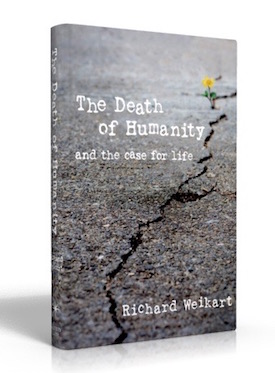 Culture & Ethics
Culture & Ethics
 Evolution
Evolution
 Intelligent Design
Intelligent Design
The Darwinian Origins of Euthanasia Advocacy
It’s not for nothing that Discovery Institute’s Center for Science & Culture is called that. Ideas about nature and about culture — the way we live, how we think about right and wrong, about meaning in life — go together, inextricably.
 Scientism is the notion that science can tell us everything we need to know about ethics and about how to order a flourishing society. Another view is that nature itself represents merely the fulfillment of a design conceived outside the material world. In this latter perspective, rather than imagining that science — a limited, human endeavor — can inform us in all things, we reasonably seek the guidance of the intelligent source of nature’s design.
Scientism is the notion that science can tell us everything we need to know about ethics and about how to order a flourishing society. Another view is that nature itself represents merely the fulfillment of a design conceived outside the material world. In this latter perspective, rather than imagining that science — a limited, human endeavor — can inform us in all things, we reasonably seek the guidance of the intelligent source of nature’s design.
In an essay in The Human Life Review, historian Richard Weikart offers a case in point. He asks, “Does Science Sanction Euthanasia or Physician-Assisted Suicide?” (You can download the entire issue of the journal for free, here.) Eugenic thinking, we know, has its roots in 19th-century evolutionary science. Less familiar is the extent to which advocacy for euthanasia, “mercy killing,” shares these Darwinian origins. That’s the theme of Dr. Weikart’s fascinating article. (For more see Weikart’s new book, The Death of Humanity: And the Case for Life.)
It goes back, not surprisingly, to Haeckel:
In Germany the first serious proposal to kill people with disabilities came from Ernst Haeckel, a leading Darwinian biologist. In the 1870 edition of his popular book on biological evolution, The Natural History of Creation, he proposed killing infants with disabilities. He worried that modern medicine and humanitarianism would allow the weak and sick to survive to reproduce, thus subverting humanity’s evolutionary progress. To prevent such an outcome, he suggested various eugenics proposals, including infanticide. By 1904, Haeckel was publicly supporting the killing of disabled adults. He thought decisions on who should be killed should be left to the physicians, not the patients.
These ideas found their way to England:
In 1870, the same year as Haeckel’s book, Samuel D. Williams wrote an essay entitled “Euthanasia” for the Essays of the Birmingham Speculative Club, setting off the British debate over euthanasia. Despite the journal’s small circulation, Williams’ essay attracted attention and provoked discussion in other British journals in the 1870s. Like Haeckel, Williams wished to replace the Judeo-Christian sanctity-of-life ethic with a secular, scientific ethic. Both men stressed euthanasia’s beneficial role in the evolutionary struggle for existence. Williams pointed out that the struggle for survival in nature results in “the continuous crushing out of the weak, and the consequent maintenance of what is called ‘the vigour of the race.'”
From there it was an easy leap across the Atlantic to the United States. Other scholars acknowledge the role of Darwinism in making this possible:
What brought about this shift — a minority shift, but very significant nonetheless — in thinking about suicide, assisted suicide, and killing the disabled in the late nineteenth and early twentieth centuries? Ian Dowbiggin and Nick Kemp in their fine studies of the history of the euthanasia movement in the United States and Britain, respectively, both emphasize the role of secularization in general and Darwinian theory in particular in mediating this transformation. Dowbiggin states, “Trends such as eugenics, positivism, social Darwinism, and scientific naturalism had the effect of convincing a small yet articulate group in the early twentieth century that traditional ethics no longer applied to decisions about death and dying.” He concludes, “The most pivotal turning point in the early history of the euthanasia movement was the coming of Darwinism to America.”
Nazi Germany drew inspiration from the American example. Weikart chillingly recalls how under the Third Reich, “The physicians and staff at Hadamar were so enthusiastic about their mass murder of those with disabilities that they threw a party celebrating the death of their ten-thousandth victim.” By the end of World War II, the figure had reach 200,000 murdered.
Killing the disabled, not merely sterilizing them, has made a comeback since then, as our other colleague Wesley Smith voluminously documents. And the overall project is still justified in Darwinian terms — “Richard Dawkins,” notes Weikart, “has dismissed the pro-life position as ‘deeply un-evolutionary.'” About that, at least, Dawkins is right.
The picture of human life as cosmic flotsam not only should permit but should positively demand a cavalier attitude to taking life, where eliminating the weak and vulnerable suits society’s other purposes. On the other hand, recognizing that a human being — or indeed even a gorilla — reflects a designer’s creative purpose implies a very different view.
Everything in ethics, every single weighty cultural issue I can think of, hinges on the question of biological origins. The stakes are tremendous for us, whether as individuals or as a society. Why more pro-life advocates have not recognized this — or if they recognized it, fail to emphasize it — is a good question.
Photo: Gas chamber, Hadamar Euthanasia Center, by Frank Winkelmann [GFDL or CC BY 3.0], via Wikimedia Commons.
